Key takeaways:
- Motivation in research is driven by a mix of curiosity, fear of failure, and the impact of contributions to knowledge.
- Setting achievable goals and celebrating small wins enhances motivation and maintains progress.
- Creating a supportive environment through teamwork, mentorship, and an inviting workspace is crucial for sustaining motivation.
- Engagement with the broader research community and reflecting on personal growth are key to overcoming challenges in research.
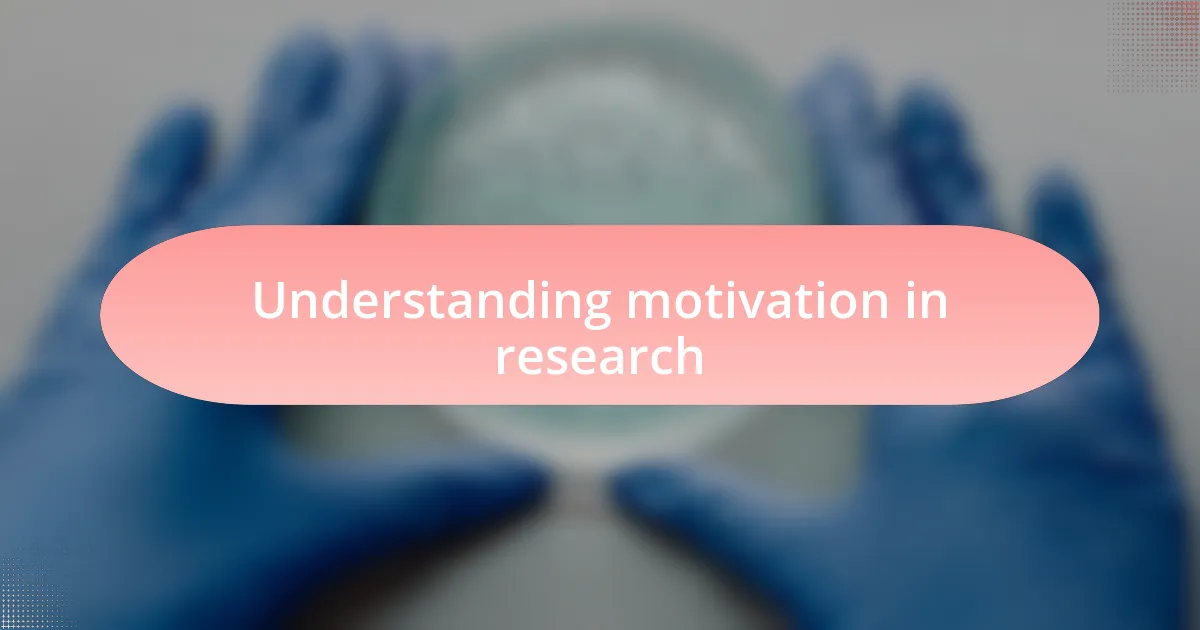
Understanding motivation in research
Understanding motivation in research is a complex yet fascinating journey. I remember a time when I felt a deep sense of purpose driving me; my goal was not just to publish, but to contribute something meaningful to our understanding of a disease. It’s moments like these that redefine what motivation truly means—it’s about impact and the passion behind the pursuit of knowledge.
What fuels our determination in research? For me, it often came down to curiosity mixed with a slight fear of failure. I recall my first big project; I was excited yet terrified. That fear transformed into motivation, urging me to dig deeper and challenge my assumptions. It’s this interplay between emotions and the drive to understand that shapes our research experience.
Moreover, I’ve found that surrounding myself with passionate colleagues significantly enhanced my motivation. Sharing ideas and facing challenges together creates a sense of community that can make even the toughest days manageable. When I would share a breakthrough with my team, their enthusiasm reinvigorated my own commitment. Have you ever felt that rush when your work resonates with others? It’s those connections that remind us why we embarked on this journey in the first place.
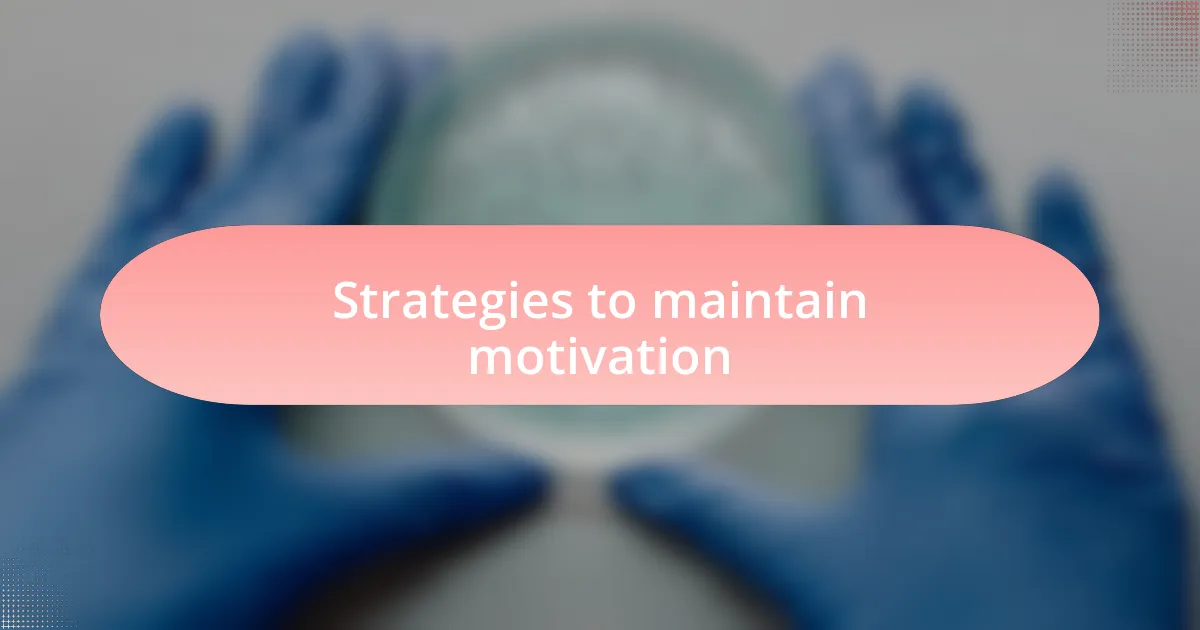
Strategies to maintain motivation
One effective strategy that has helped me maintain motivation in research is setting small, achievable goals. I remember a project where I broke down the larger objectives into weekly tasks. Each completed task felt like a mini-victory, fueling my enthusiasm to push forward. Have you ever experienced that boost of confidence after checking off your to-do list? It’s that immediate feedback that keeps us moving.
Another approach I found valuable is regularly revisiting the “why” behind my research. During particularly challenging phases, I took time to reflect on the bigger picture — the potential benefits to patients or advancements in medical knowledge. This not only rekindled my passion but also provided clarity when I felt stuck. Asking myself, “What impact could this research have?” often shifted my perspective and reignited my drive.
Finally, I discovered that celebrating small wins with my team can be a game changer. After finishing a challenging experiment, I’d suggest a team lunch or a simple acknowledgement of our hard work. These moments of recognition create a supportive atmosphere that reminds us we’re in this together. Have you ever noticed how collective celebration can elevate motivation? It’s truly inspiring to see how shared progress energizes the entire team.
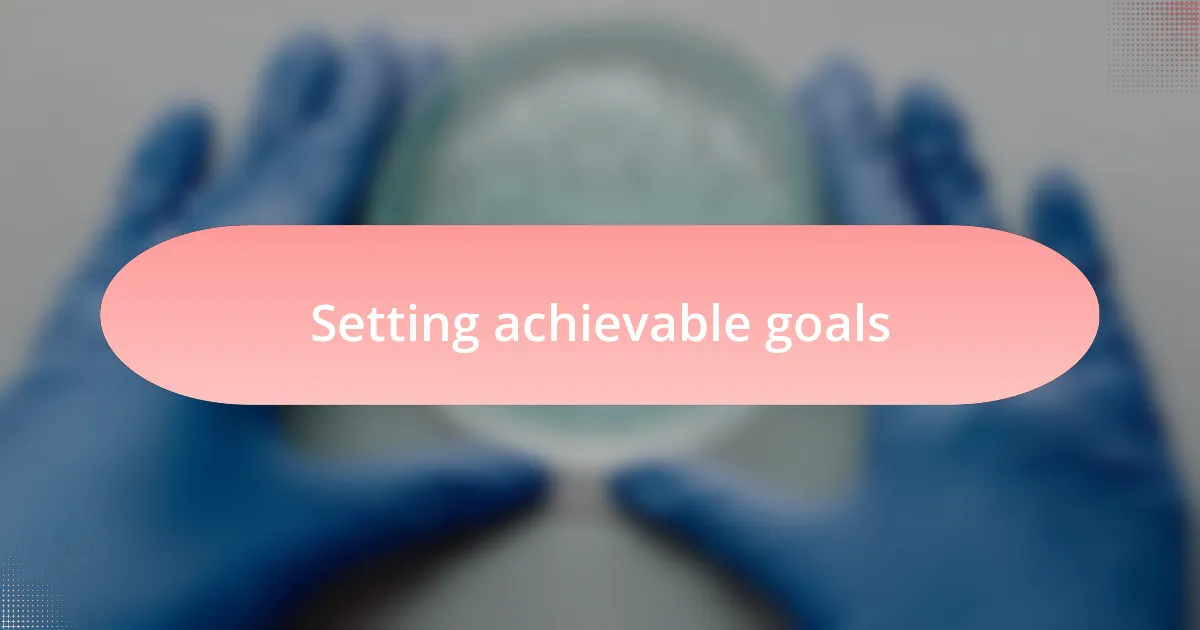
Setting achievable goals
Setting realistic, achievable goals is fundamental for maintaining motivation in the often demanding world of medical research. I vividly remember a time when I set a goal to read and analyze five research papers each week. At first, it felt daunting, but by chunking this into smaller tasks, like reading just one paper a day, I found I could sustain my progress without overwhelming myself. Have you ever felt the satisfaction of making steady strides toward a goal?
Sometimes, I would find myself overwhelmed by the complexity of my research. It was then I learned the importance of specificity in goal-setting. Instead of saying, “I want to improve my data collection,” I would set a specific target, like “I will create a data logging system by Friday.” This shift transformed my approach from vague aspirations to concrete actions, making it easier to stay focused and motivated. Have you ever noticed how clear directions can empower your efforts?
It’s also helpful to celebrate the process, not just the end results. In one of my projects, I acknowledged the small milestone of finalizing my experimental setup with a personal treat, like a favorite snack or a short break outside. These little rewards provided a much-needed boost, reinforcing that every step counts. How do you recognize your progress along the way? Finding ways to honor those small victories can be incredibly energizing.
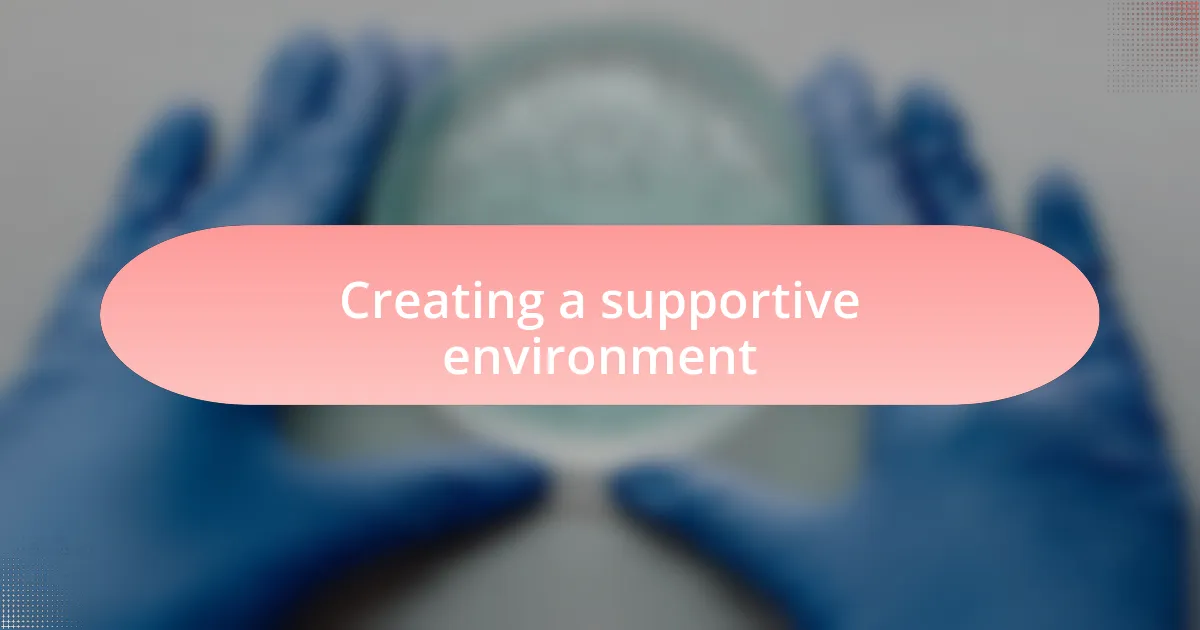
Creating a supportive environment
Creating a supportive environment is essential in medical research, where the challenges can often feel isolating. In my own experience, I found that surrounding myself with colleagues who shared similar goals made a significant difference. I remember when our lab started holding weekly check-ins where we could discuss hurdles and share triumphs. It was empowering to know I wasn’t alone in facing challenges. Have you ever experienced how powerful a shared space can be for motivation?
Another aspect of nurturing a supportive environment involves physical space. I recall how reorganizing my workspace to make it more inviting transformed my productivity. Adding personal touches, like plants or motivational quotes, encouraged a positive mindset. Do you think your surroundings influence your motivation? I certainly believe they do; a comfortable, aesthetically pleasing environment fosters creativity and focus.
Lastly, mentorship plays a crucial role in creating support. I had a mentor who always made time to guide me through tough phases of my projects. Their belief in my potential inspired me to push through difficult moments. Did you have a mentor who made an impact on your career? I learned the importance of seeking out both mentorship and peer support to build a strong network that fuels motivation and resilience.
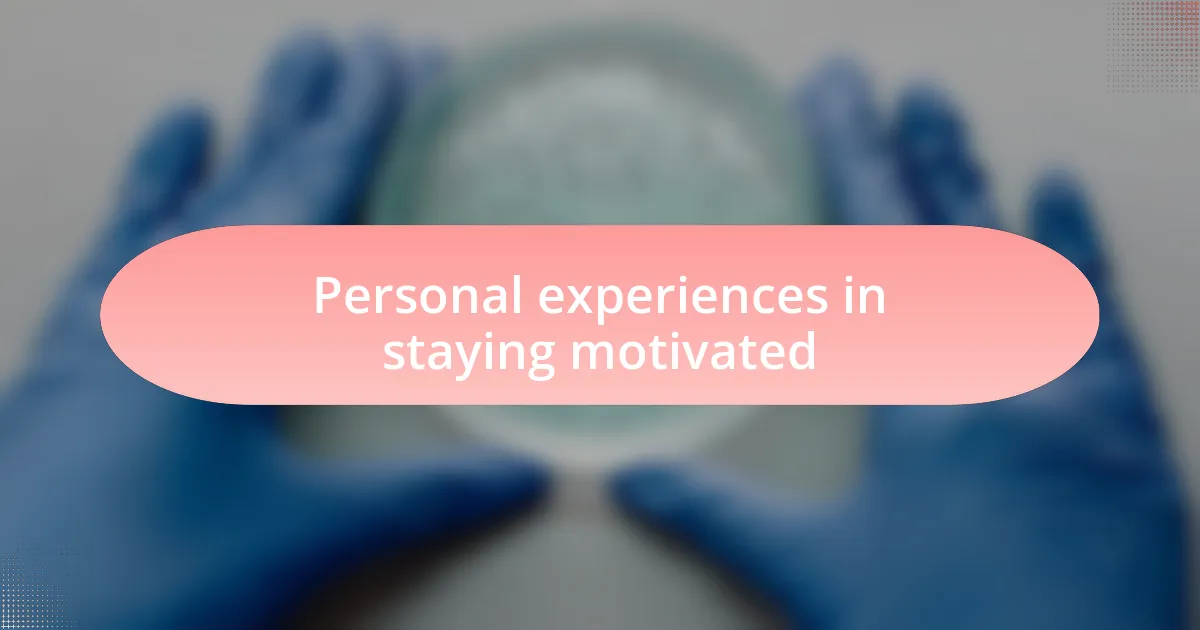
Personal experiences in staying motivated
Staying motivated during tough times in medical research has often been a balancing act for me. I distinctly remember a project that pushed me to my limits; the constant late nights began to wear on me. Interestingly, what kept me going was revisiting my initial excitement about our research topic. I would often ask myself, “What was it that drew me to this field?” Reconnecting with that passion reignited my drive and made each challenge feel more like a stepping stone rather than an obstacle.
Another pivotal experience came from celebrating small wins. Early in my career, I tended to overlook the little successes, focusing only on the big goals. One day, I decided to write down every small achievement, from completing a difficult experiment to receiving positive feedback from my peers. It was a simple yet effective shift. Have you ever tried tracking your progress? I found that acknowledging these moments created a sense of accomplishment that fueled my motivation and made the journey more enjoyable.
Moreover, engaging with the broader scientific community significantly boosted my motivation. I once attended a conference where I shared my research findings. The conversations I had with other researchers invigorated my spirit and sparked new ideas. Not only did I feel validated, but it also reminded me of the impact our work can have on advancing knowledge. Isn’t it fascinating how connecting with others can amplify your motivation? I truly believe that exchanging ideas and experiences revitalizes our commitment to our research endeavors.
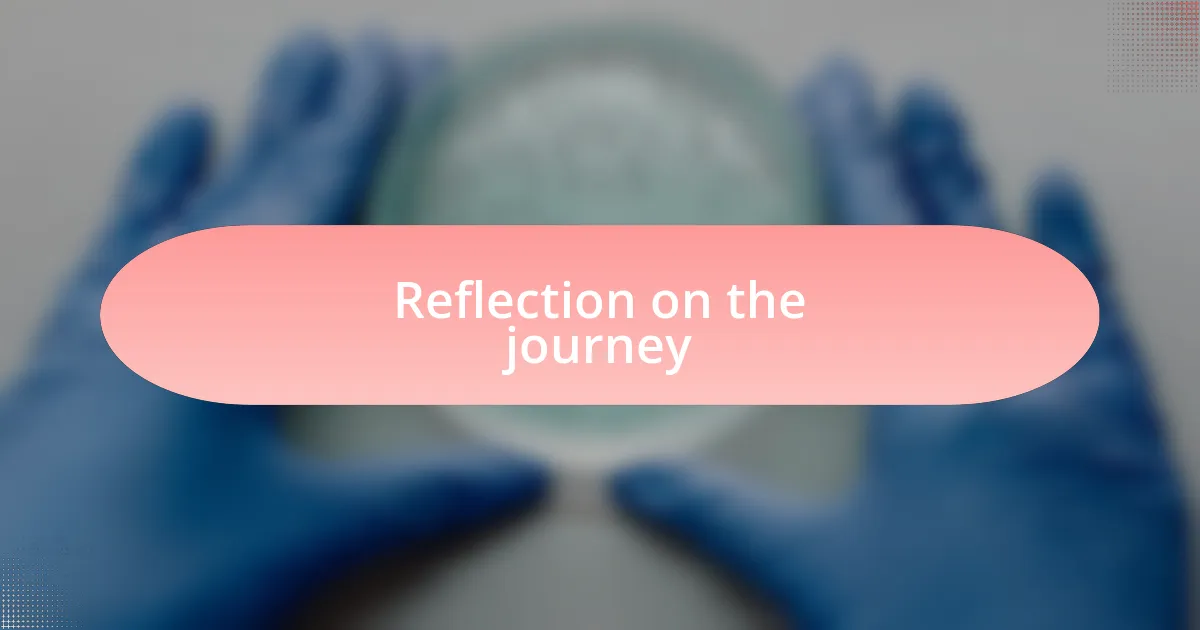
Reflection on the journey
Reflecting on my journey in medical research often brings me back to moments of self-doubt. I recall a time when I faced unexpected setbacks in my experiments, which left me questioning my capabilities. In those instances, I found solace in journaling my thoughts and feelings. Writing about my frustrations not only provided clarity but also served as a reminder of how resilience can come from acknowledging vulnerabilities.
I also have clear memories of the mentors who shaped my path. During my early years, I had a mentor who frequently reminded me that challenges are not signs of failure but opportunities for growth. That perspective shift was monumental; it encouraged me to view each hurdle as a puzzle to solve. Do you have mentors who inspire you? I learned that having someone to guide you through tough moments can reignite your passion and keep you moving forward.
One particularly transformative reflection occurred after I completed a long-term study. As I reviewed the data, I felt a wave of accomplishment wash over me. It struck me how far I had come—not just in my research, but personally as well. Have you ever taken a moment to appreciate your growth? Recognizing progress, regardless of scale, is essential. It reinforces the notion that each effort contributes to a larger purpose.